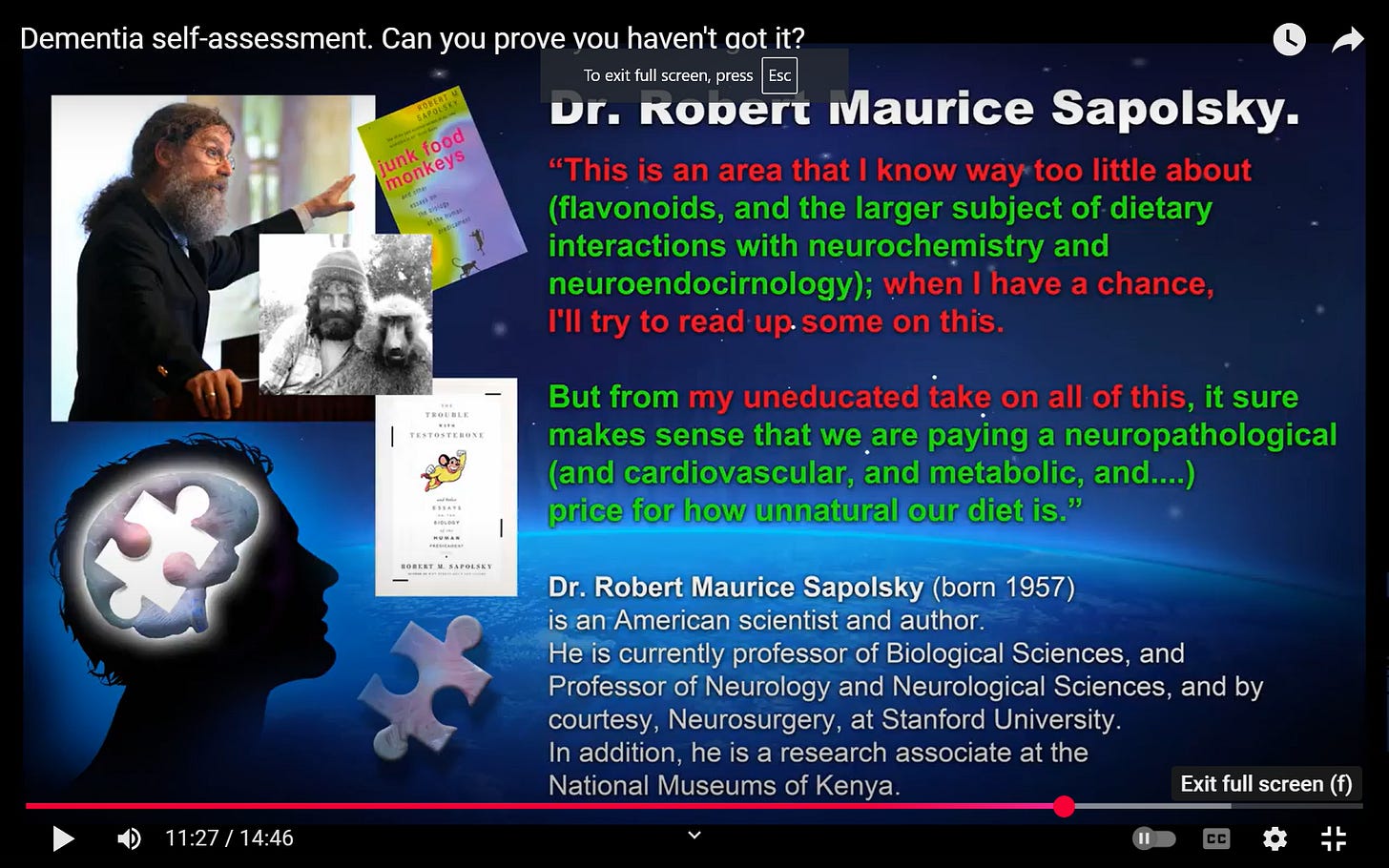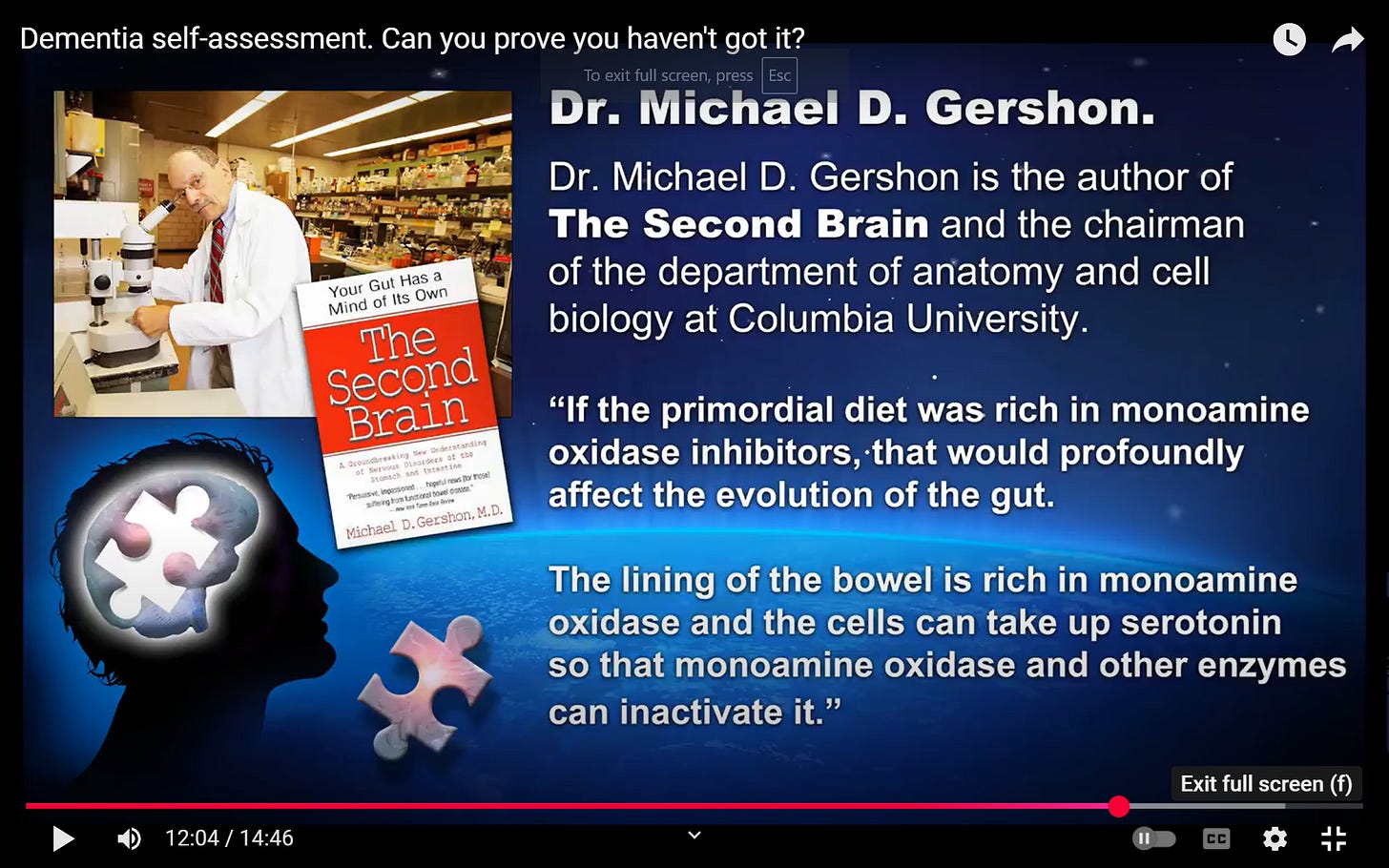Diet - loss of phytonutrient content likely has decreased brain development in our species over centuries.
Video, quotes by 3 doctors. Monoamine oxidase inhibitors in plant foods may be protective - nutmeg, turmeric, kava, pomegranate, and a few others are listed.
Dementia risk and modern diet are linked, gut microbiome health is part of the negative effect. Dementia self-assessment. Can you prove you haven't got it?, Tony Wright, (Youtube), via (x.com/Vikasa1618).
Dr. Katherine Milton, anthropology and diet of primates and humans. (ourenvironment.berkeley.edu/people/katharine-milton)
“Dr. Milton’s data leads to a stark conclusion, we have lost at least 95% of the unique and extraordinarily complex chemical cocktail once integral to our co-evolutionary ecology via diet.” 95% loss of phytonutrients that can affect our body’s design by modifying transcription of DNA into proteins; phytonutrients used to construct new cells or other structural materials of the body; phytonutrients that are potent antioxidants protecting us from inflammation; and 95% loss of food components that stimulate our pineal gland and brain (neuro-chemically active).

Dr. Robert Sapolsky - “This is an area that I know way too little about (flavonoids, and the larger subject of dietary interactions with neurochemistry and neuroendocrinology); when I have a chance I’ll try to read up some on this. But from my uneducated take on all of this, it sure makes sense that we are paying a neuropathological (and cardiovascular, and metabolic, and…) price for how unnatural our diet is.” — Stanford Professor of Biology and Neurology, (profiles.stanford.edu/robert-sapolsky).
Robert Sapolsky has written a number of books for lay readers including “Why Zebras Don’t Get Ulcers. (thriftbooks.com)

Dr. Michael C. Gershon, Professor of Pathology and Cell Biology at Columbia University, (bio, pathology.columbia.edu), and author of the book ‘Your Gut has a Mind of Its Own - The Second Brain’. (thriftbooks.com)
“If the primordial diet was rich in monoamine oxidase inhibitors, that would profoundly affect the evolution of the gut. The lining of the bowel is rich in monoamine oxidase and the cells can take up serotonin so that monoamine oxidase and other enzymes can inactivate it.” - Dr. Michael D. Gershon.

Herbs or foods with monoamine oxidase inhibiting phytonutrients include nutmeg, turmeric, kava, passionflower, ayahuasca, and Syrian rue. (healthfully.com) … and pomegranate juice or fruit or peel extract. (Les, et al., 2017)
*If you try to search for “monoamine oxidase inhibitors and diet”, then diet advice for avoiding tyramine rich foods will be the search results as it is a common diet given to people on prescription MOA inhibiting medications. Those may be prescribed for anxiety or depression but have side effects. Drinking some Golden Milk made with turmeric or pomegranate juice or tea made with the rind, or kava or passionflower tea, might help mood and reduce inflammation too.
Disclaimer: This information is being provided for educational purposes within the guidelines of Fair Use and is not intended to provide individual health care guidance.
Reference List
(Les, et al., 2017) Les, F., Carpéné, C., Arbonés-Mainar, J.M., Decaunes, P., Valero, M.S., López, V., Pomegranate juice and its main polyphenols exhibit direct effects on amine oxidases from human adipose tissue and inhibit lipid metabolism in adipocytes, Journal of Functional Foods, Vol 33, 2017, pp 323-331, ISSN 1756-4646, https://doi.org/10.1016/j.jff.2017.04.006. https://www.sciencedirect.com/science/article/pii/S1756464617301974




